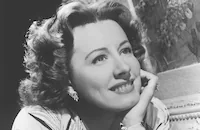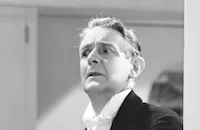The Age of Innocence

Brief Synopsis
Cast & Crew
Philip Moeller
Irene Dunne
John Boles
Lionel Atwill
Helen Westley
Laura Hope Crews
Film Details
Technical Specs

Synopsis
When the illicit affair of his grandson Dallas makes headlines in the New York newspapers, lawyer Newland Archer relates to him the story of his own romantic past: At his 1875 engagement party, Newland is re-introduced to Ellen, a childhood friend and the cousin of his fiancée, May Welland. Because she has left her husband in Paris, Ellen, whose married title is Countess Olenska, is considered a social liability but is treated with respect and civility by Newland and his conservative family. When the liberal-minded Ellen, who has moved into a house in Greenwich Village, asks Newland to undertake divorce proceedings on her behalf, however, Newland convinces her that a divorce would ruin her reputation and would cause her family great grief. Although anxious to be free, Ellen listens to Newland's advice and drops her divorce action. However, after Newland sees how attentive Julius Beaufort, a notorious adulterer, is to Ellen, he changes his mind and recommends to her that she renew her divorce plans. Ellen resists Newland's suggestion, convinced that the tranquility of her family, in particular her grandmother, is more important than her own romantic happiness. Filled with doubt about his own upcoming marriage, Newland then visits May, who has been forced by her parents into a year-long engagement, in Florida. Although tempted to break with May, Newland instead reassures her about his feelings and returns to New York. At the urging of his mother, who senses his anxiety about Ellen, Newland soon leaves for a visit with family friends in the country. When Newland and Ellen run into each other there, they confess their mutual love but are surprised by the unexpected arrival of May and her parents, who have suddenly decided on a quick wedding. In spite of themselves, Newland and Ellen continue to see each other after the wedding and make plans to take the train together for a weekend in Washington, D.C. After Ellen leaves him waiting at the train station, Newland discovers that she has booked passage on a Europe-bound ship. Overwhelmed by Ellen's unexplained departure, Newland is about to ask May for a divorce when she reveals that she is pregnant and had told Ellen about her condition the previous day. Sobered by his approaching fatherhood, Newland embraces May and accepts the loss of Ellen. Back in the present, Newland, now a widower, concludes his story and is shocked when Dallas tells him that Ellen is waiting for him in a New York hotel. Newland, however, refuses to see her, wishing instead to remember their love "as it was."

Director

Philip Moeller
Cast

Irene Dunne

John Boles

Lionel Atwill

Helen Westley

Laura Hope Crews

Julie Haydon
Herbert Yost
Theresa Maxwell Conover
Edith Van Cleve

Leonard Carey
Crew
Pandro S. Berman
John L. Cass
Victor Heerman
Al Herman
George Hively
Louis Jennings
Edward Killy
Jane Loring
Sarah Y. Mason
John Miehle
Walter Plunkett
Van Nest Polglase
Max Steiner
James Van Trees
James Van Trees Jr.

Videos
Movie Clip



Film Details
Technical Specs

Articles
The Age of Innocence (1934)
Dunne got the role of Ellen after Katharine Hepburn turned it down. RKO borrowed John Boles from Fox to co-star as Newland Archer, no doubt looking to repeat the huge success of Back Street (1932), which had also starred Dunne and Boles. But lightning wouldn't strike twice. Aside from the laborious nature of the movie itself ("painstaking but emotionally flaccid," said The New York Times) was its timing. The height of the Great Depression was perhaps not the best time for a movie about the problems of upper-crust New Yorkers. People craved films that spoke to their problems, or, more often, they just wanted escapism. As Variety put it, "[the film] has doubtful appeal for younger folks wanting action and excitement on the screen." The best reason to look at The Age of Innocence today is Dunne's performance, although Helen Westley as Mrs. Mingott, the flighty but good-natured grandmother, also stands out in the cast.
The Age of Innocence has been a popular source for adaptation since it was published in 1920 and won the Pulitzer Prize for Edith Wharton. A 1924 Warner Bros. movie was directed by Wesley Ruggles. A 1928 Broadway stage adaptation by Margaret Ayer Barnes starred Katharine Cornell and ran 209 performances. It turned up on radio in 1947 with Gene Tierney and in 1951 with Claudette Colbert. Martin Scorsese's 1993 movie, however, will no doubt remain the definitive version.
Interestingly, the part of Ellen Olenska in the Scorsese remake went to an equally versatile and elegant modern-day leading lady: Michelle Pfeiffer. Prior to her superb take on Ellen Olenska, Pfeiffer had already established herself as comedienne (Married to the Mob, 1988), romantic singer (The Fabulous Baker Boys, 1989), and dramatic actress of thrillers (The Russia House, 1990) and costume pictures (Dangerous Liaisons, 1988). Oscar has looked down on Dunne and Pfeiffer fairly equally, too. Dunne had five Academy Award nominations over her career, and Pfeiffer has had three so far (as well as six Golden Globe nominations and one win). Like Dunne before her, Pfeiffer's nominations have been for roles across a very wide variety of genres.
Producer: Pandro S. Berman
Director: Philip Moeller
Screenplay: Sarah Y. Mason, Victor Heerman, Edith Wharton (novel)
Cinematography: James Van Trees
Film Editing: George Hively
Art Direction: Alfred Herman, Van Nest Polglase
Music: Max Steiner
Cast: Irene Dunne (Countess Ellen Olenska), John Boles (Newland Archer), Lionel Atwill (Julius Beaufort), Helen Westley (Granny Manson Mingott), Laura Hope Crews (Augusta Welland), Julie Haydon (May Welland).
BW-71m. Closed captioning.
by Jeremy Arnold

The Age of Innocence (1934)
Quotes
Trivia
The original play based on Edith Wharton's novel and written by Margaret Ayer Barnes opened in New York on 27 November 1928.
Notes
Philip Moeller made his screen directing debut in the film, and Edith Van Cleve made her screen acting debut. RKO borrowed John Boles from Fox for the project. According to modern sources, photographer James Van Trees and his crew were borrowed from Twentieth Century. A Hollywood Reporter news item states that RKO wanted Lowell Sherman to direct the film, but conflicting obligations at Universal prohibited him from accepting the job. According to a Film Daily news item, Katharine Hepburn was considered for the part of "Ellen." Hollywood Reporter production charts list Jane Murfin as a co-writer with Heerman. Her contribution to the final film has not been determined. In 1924, Wesley Ruggles directed Edith Roberts and Elliott Dexter in a silent Warner Bros. version of Edith Wharton's novel (see AFI Catalog of Feature Films, 1921-30; F2.0064). Edith Warton's novel also formed the basis for the 1993 Columbia film The Age of Innocence, directed by Martin Scorsese and starring Daniel Day-Lewis, Michelle Pfeiffer and Winona Ryder.














